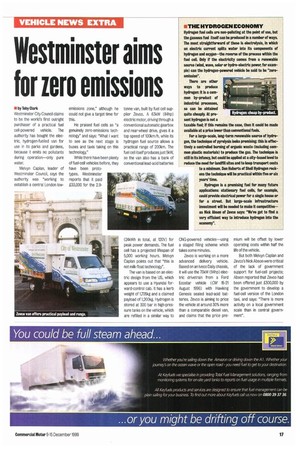THE HYDROGEN ECONOMY Hydrogen fuel cells are non-polluting at the
Page 19

If you've noticed an error in this article please click here to report it so we can fix it.
point of use, but the gaseous fuel itself can be produced in a number of ways. The most straightforward of these is electrolysis, in which an electric current splits water into its components of hydrogen and oxygen—the reverse of the process within the fuel call. Only if the electricity comes from a renewable source (wind, wave, solar or hydro-electric power, for example) can the hydrogen-powered vehicle be said to be "zeroemission".
There are other ways to produce hydrogen: it is a common by-product of Industrial processes, so can be obtained quite cheaply. At present hydrogen is not a taxable fuel; if this remains the case, then it could be made available at a price lower than conventional fuels.
For a large-scale, long-term renewable source of hydrogen, the technique of pyrolysis looks promising: this is effectively a controlled burning of organic waste (including common plastic materials) to produce the gas. The technique is still in its infancy, but could be applied at a city-based level to reduce the need for landfill sites and to keep transport costs
to a minimum, Don Huberts of Shell Hydrogen reck ons the technique will be practical within five or six years' time.
Hydrogen is a promising fuel for many future applications: stationary fuel cells, for example, could provide electrical power for a single house or for a street. But large-scale infrastructure investment will be needed to make it competitive— as Nick Abson of levc.o says: "We've got to find a very efficient way to introduce hydrogen into the economy".




































































































